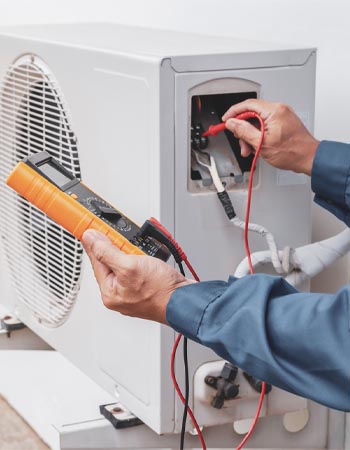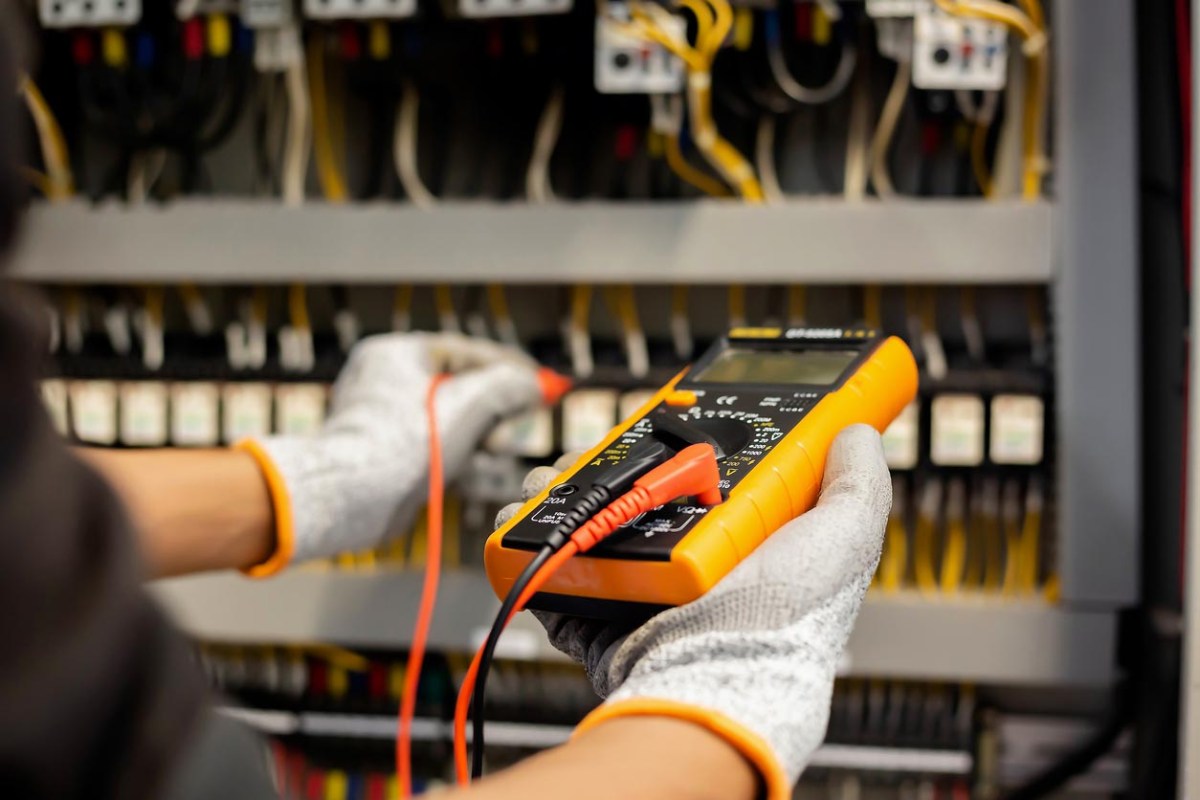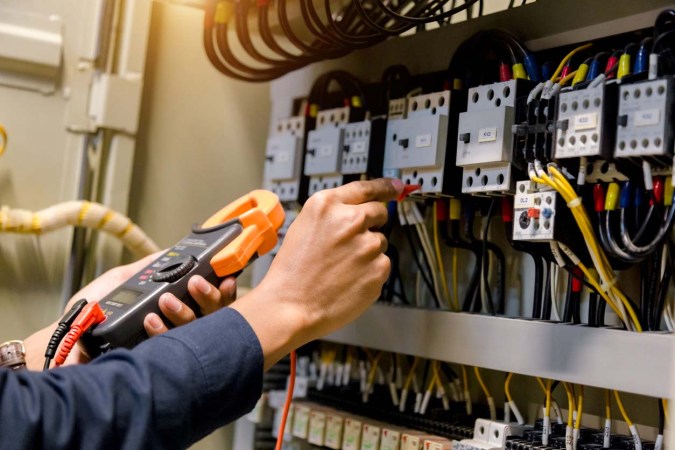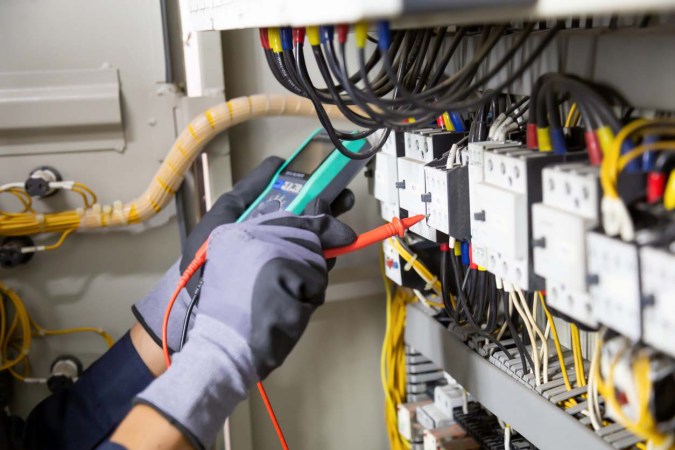We may earn revenue from the products available on this page and participate in affiliate programs. Learn More ›
Electricians are well-compensated tradespeople—the U.S. Bureau of Labor Statistics reports that the median annual pay for an electrician in 2022 (the most recent year for which data is available) was $60,240, and an electrician can make even more than that with the right experience and training. To really rake in the bucks, many skilled electricians opt to start their own electrical business rather than work under another electrician. Being their own boss allows them to set their electricity business rates, design their schedules, and generally make their own decisions as long as they meet certain requirements.
This guide is designed to help aspiring and current electricians who are considering starting their own electrical business. Electricians will learn more about how to start an electrical business so they can make a plan to reach their professional goals.
Before You Begin…

It’s important for aspiring entrepreneurs to recognize that they don’t necessarily need to start their own electrical business to have a lucrative and rewarding career in the electrical industry. Electrical technology is changing every day, and electricians who continue to grow their skill sets will be more in demand over time and can increase their earnings as their knowledge and experience increases.
Also, it’s important for electricians to understand that their daily work routine will likely change when they’re running an electrical business. Rather than wiring houses or replacing circuit boards, they may be hiring and training employees, holding meetings, and shopping for insurance plans. If those activities aren’t appealing, an electrician may be better suited to being an employee at another electrical business than owning their own business.
Tips for Starting an Electrical Business
- Be patient. The process of becoming an electrician is long, and in some cases, it can take as many as 10 years before an electrician is in a place to start their own business.
- Start small. Before jumping into owning a full-fledged electrical business, an electrician can get their license, register a business name, and carry insurance while they’re still working for someone else.
- Understand local requirements. Each state’s rules are different. Electricians will want to make sure they understand all of the licensing and insurance requirements within their state.
STEP 1: Complete the training and work hours required to get your electrician license.
The first step for an individual to take when starting an electrical business is to get the required electrician license. In some states, a journeyman’s license is all an electrician needs to start their own business. In other states, a contractor may be required to have a master electrician’s license to legally start a business.
In either case, the path to both licenses starts with an apprenticeship. An apprenticeship is when a new electrician works under the supervision of a licensed electrician for several years, learning the trade from a professional.
“Most electrical apprenticeships have eligibility requirements including a high school diploma and proof of successfully completing algebra classes,” explains Stephan Cole, corporate field trainer with Rosendin, a nationwide electrical contractor with headquarters in San Jose, California. “There will be an interview process and the interviewers will ask you why you want to be an electrical worker and why you applied to this program; therefore, it would be wise to research the industry and the apprenticeship program that you are applying to, so you are ready and sure this is what you want to do.”
Each U.S. state has specific criteria that apprentices must meet before they can earn their next license (the journeyman license, in many cases). These requirements typically include a set number of work hours and/or a specific number of classroom hours (either in person or through one of the best online electrician schools). Once an electrician has met these minimums, they can take their journeyman licensing exam.
If the state requires an electrician to hold a master electrician license to start a business, an electrician typically has two options:
- Get more work experience. A journeyman electrician can opt to work for several years under an experienced master electrician until they’re eligible to take their master electrician license exam. The exact amount of work experience needed to qualify for a master electrician license varies from state to state.
- Hire a master electrician. A journeyman electrician can hire a master electrician as an adviser and use their license to meet the state’s requirements for starting their business. Eventually, the business owner will be qualified to take their master electrician licensing exam, but they can operate legally under the master electrician’s license in the meantime.
STEP 2: Write a comprehensive business plan.
Once an electrician has the correct license and is ready to start their own business, they’ll need to write up an electrical business plan. This comprehensive document will include everything an entrepreneur needs to chart their course to success, and they’ll be able to refer back to it when they’re looking for investors, planning to scale, and making business decisions.
The following are some items an electrician business plan will need to include.
- Executive summary. This describes the entrepreneur’s business plan in one page, including what sets them apart from the competition.
- Business overview. This states the business name, important dates such as when the business was originally registered, and summarizes the business structure.
- A list of services. This section will include the specific electrical services the business will offer to customers. It could be a basic list of residential services, or it could include specialized services the business owner offers, which they may have obtained specific training to perform.
- Market analysis. This section will describe the business’s target customers and the competition in the area from other electrical businesses.
- Financial plan. This will include the business’s pricing strategy and profitability forecast, including how much money is expected to come into and go out of the business within the first year.
- Marketing strategy. This section describes how the business owner will market or advertise their business.
Electricians who aren’t sure how to write a business plan can enlist the help of a coworker or mentor, or even hire a professional business plan writer.
STEP 3: If necessary, secure financing to help fund your business start-up.
Starting an electrician business can be expensive. Some of the most common expenses an electrician will come across when starting a business include licensing fees, insurance premiums, tool and equipment purchases, and business vehicle purchases. The electrician may already have a vehicle or the basic tools needed to run an electrical business, but if they don’t, they’ll need to determine how to cover those start-up costs.
There are several options for an entrepreneur to secure money to start a new business, including the following.
- Taking out a small-business loan, either from a private lender or from the U.S. Small Business Administration.
- Tapping into their home’s equity through one of the best home equity loans, such as one from U.S. Bank or Flagstar Bank.
- Asking friends and family members to invest in their company or partner with them.
- Working extra hours with an employer to save the required money.
- Setting up a crowdfunding campaign to raise money.
Whatever decision an electrician makes, they’ll want to make sure they discuss it with a financial adviser to ensure they’re making the wisest choice possible for securing the financing they need.

STEP 4: Choose a business structure.
Once an electrician has a plan in place and the funding for their business, it’s time for them to choose a business structure. There are three main options an aspiring business owner can choose from.
- Sole proprietorship: Sole proprietorships are great for one-person small businesses, and they’re easy to set up. However, they don’t offer protection for the owner’s personal assets, which could cause issues if a future client sues the electrician in the event of property damage or injury that occurs during the course of a job.
- Limited liability company: An LLC is a common option for small electrical companies (even if they’re a one-person shop). This business structure includes more tax benefits for owners than a sole proprietorship and a layer of protection between personal assets and business assets.
- S corporation: An S corporation (sometimes shortened to S corp) is a business structure that provides liability protection and increased tax benefits for an electrical contractor.
Contractors will want to consult with a tax adviser or attorney before determining which structure is best suited for their business. They may even want to enlist the help of one of the best LLC services, such as LegalZoom or Northwest Registered Agent, to help them register their business.
STEP 5: Get the appropriate business licenses required by your state or local government.
Next, a business owner will need to register their business name with the state and secure the appropriate types of business licenses needed for them to run their business legally. These licenses are different from an electrician’s license, which is a type of trade license. Trade licenses allow the holder to work in a specific trade, while a business license allows them to operate a business within the state or local municipality.
The process of getting a business license involves a business owner registering their name and filling out the appropriate paperwork. This can usually be done through their secretary of state’s office, but some states have their own business licensing agencies, so it’s important for an entrepreneur to research the rules in their location. Once this process is complete, the contractor will have the required license and tax identification numbers that allow them to operate legally within the jurisdiction.
STEP 6: Get the appropriate business insurance coverage.
Business insurance may seem like an afterthought, but it is a necessity for all types of businesses. According to InterCoast Colleges, business insurance can help protect an electrician’s business and their money should a client sue them. All electricians need some form of general liability insurance, which pays for property damages or injuries to clients that occur while the electrician is on the job (up to the policy limits). For example, a general liability policy will help pay for repairs to a client’s home if the electrician’s ladder slips and breaks a window, or if the client trips over an extension cord laid out by the electrician and sustains an injury.
In addition to general liability insurance, electrical contracting company owners might consider the following types of insurance coverage.
- Inland marine insurance: This type of insurance covers an electrical business’s tools and equipment. If the covered items are damaged or stolen while being transported to or from a jobsite, inland marine insurance may help to repair or replace the covered items, less the deductible. Coverage may also apply when the tools and equipment are in storage or at a jobsite.
- Commercial auto insurance: This type of insurance covers vehicles owned and operated by the business. It can cover the costs of vehicle repairs after a collision or other type of covered damage, medical bills for injuries resulting from an accident, and any legal fees in the event of a lawsuit.
- Workers’ compensation insurance: This type of insurance covers medical costs and lost wages for employees who get hurt or become ill while on the job. It can also provide death benefits to dependents if an employee is killed while at work.
Many of the best small-business insurance companies, such as NEXT or Thimble, can bundle these policies into one for convenience and a discount as well.
STEP 7: Purchase the tools and equipment you need to get your business off the ground.
Practicing electricians likely have a basic set of the best electrician tools necessary to help them get started with their business. As they expand their offerings, however, they may need more expensive equipment, more powerful tools, special software for an electrical design business, and other business tools that help grow their company.
Business owners will want to ask themselves whether it’s best for them to buy a piece of equipment or to rent it. Alternatively, the owner can purchase the equipment and then rent it out for additional income. Since new business owners won’t want to spend money on unnecessary tools and equipment when they’re starting out, they’ll want to take their time when making major purchases, even if they need equipment to get their business off the ground.
STEP 8: Choose a business accounting software to help you track invoices and expenses.
There are certain aspects of being a business owner that can be streamlined or automated with the right software. Accounting software is a big help, as such programs can help the business owner produce and track invoices, balance accounts, track expenses, and even receive payments.
Choosing the best accounting software comes down to several factors. The software has to be within the business owner’s budget while also offering all the features they need to help their business run smoothly. As the business grows and its needs change, the owner can upgrade subscriptions or switch to more expensive, more comprehensive software down the road.
There are several options on the market, with Jobber being one of the biggest names in the space. New business owners will want to do their research by asking fellow electrical business owners which software they use and reading online reviews (such as Jobber reviews) to see which option would best suit their needs.

STEP 9: Determine which services your business will offer and set pricing.
Electrical business owners get to determine the types of electrician services they offer. For instance, they may choose to work solely in residential projects, commercial projects, or both. They can also provide industrial electrical installation company services or work primarily with generators, switchgear, and other equipment. Some may choose to work with audio and visual equipment or low-voltage technology. There are many career paths for an electrician, which makes this profession even more appealing to those looking to specialize.
Another benefit of being the boss is that the electrician can set their own pricing. They can choose to offer flat rates for certain projects or charge an hourly electrician cost. If their costs rise, they can transfer the increase to their customers by raising their hourly rate. By pricing their services fairly and competitively, they can ensure a steady electrician salary for themselves and their employees.
STEP 10: Create a marketing plan that includes a business website and a digital marketing strategy.
All electrical businesses need marketing plans to help build brand awareness and attract new clients, and this goes far beyond printing electrician business cards to hand out to potential customers.
A website is a necessity, in that it provides a place where prospective customers can learn more about the business and contact the owner. Business owners with web experience can create their own business website from scratch, or they can use a website creation tool. Alternatively, a business owner can hire a web developer to build and/or maintain their website.
It’s important for the person running the business website to have a baseline understanding of search engine optimization (SEO), which is a process that makes it more likely for a website to come up in a search results page for related keywords. For example, a well-optimized electrician website is more likely to show up on Google after a potential customer searches for “hire an electrician near me” than one that lacks basic SEO principles. Business owners who aren’t familiar with SEO will likely want to hire a third-party agency or freelancer to take care of this for them.
In addition to a well-optimized and user-friendly website, electrical-business owners will want to invest in digital marketing in the form of social media, video, and ads. Running an Instagram page that showcases previous projects, filming YouTube videos that explain processes and highlight projects, and paying for internet ads targeting potential customers are all critical to growing a successful business.
STEP 11: Hire electricians and grow your business.
Once the business has been established, the owner will need to start looking into how they can grow the business, which is often called “scaling.” Scaling requires employees, such as office staff, managers, and more electricians.
Electrical-business owners will want to interview and hire journeyman electricians who know what they’re doing, as well as give back to the electrical community by hiring apprentices who want to learn the trade. In some cases, the business owner might even supply them with trucks or vans to get them from the shop to the jobsite. Best practices include providing these employees competitive wages, health care and retirement benefits, and time off, which helps them feel appreciated and builds loyalty to the electrician company.
Once an aspiring entrepreneur understands how to start an electrical business, they can make a plan to take themselves from employee to employer and build their future. Being a business owner is much different than being an electrician working for an employer, but with the right mindset, work ethic, and plan, it’s a great way for an electrician to achieve the business and lifestyle of their dreams.

















